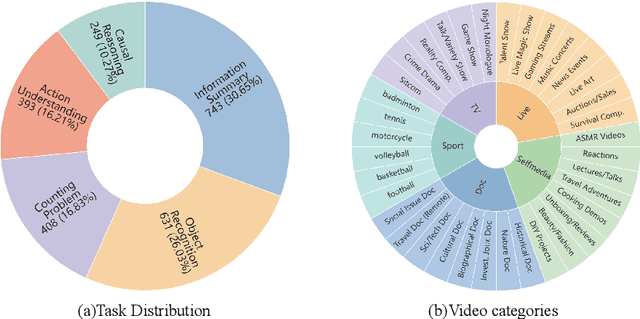Huaqing Yuan
ScaleLong: A Multi-Timescale Benchmark for Long Video Understanding
May 29, 2025



Abstract:Although long-video understanding demands that models capture hierarchical temporal information -- from clip (seconds) and shot (tens of seconds) to event (minutes) and story (hours) -- existing benchmarks either neglect this multi-scale design or scatter scale-specific questions across different videos, preventing direct comparison of model performance across timescales on the same content. To address this, we introduce ScaleLong, the first benchmark to disentangle these factors by embedding questions targeting four hierarchical timescales -- clip (seconds), shot (tens of seconds), event (minutes), and story (hours) -- all within the same video content. This within-content multi-timescale questioning design enables direct comparison of model performance across timescales on identical videos. ScaleLong features 269 long videos (avg.\ 86\,min) from 5 main categories and 36 sub-categories, with 4--8 carefully designed questions, including at least one question for each timescale. Evaluating 23 MLLMs reveals a U-shaped performance curve, with higher accuracy at the shortest and longest timescales and a dip at intermediate levels. Furthermore, ablation studies show that increased visual token capacity consistently enhances reasoning across all timescales. ScaleLong offers a fine-grained, multi-timescale benchmark for advancing MLLM capabilities in long-video understanding. The code and dataset are available https://github.com/multimodal-art-projection/ScaleLong.
COIG-P: A High-Quality and Large-Scale Chinese Preference Dataset for Alignment with Human Values
Apr 07, 2025Abstract:Aligning large language models (LLMs) with human preferences has achieved remarkable success. However, existing Chinese preference datasets are limited by small scale, narrow domain coverage, and lack of rigorous data validation. Additionally, the reliance on human annotators for instruction and response labeling significantly constrains the scalability of human preference datasets. To address these challenges, we design an LLM-based Chinese preference dataset annotation pipeline with no human intervention. Specifically, we crawled and carefully filtered 92k high-quality Chinese queries and employed 15 mainstream LLMs to generate and score chosen-rejected response pairs. Based on it, we introduce COIG-P (Chinese Open Instruction Generalist - Preference), a high-quality, large-scale Chinese preference dataset, comprises 1,009k Chinese preference pairs spanning 6 diverse domains: Chat, Code, Math, Logic, Novel, and Role. Building upon COIG-P, to reduce the overhead of using LLMs for scoring, we trained a 8B-sized Chinese Reward Model (CRM) and meticulously constructed a Chinese Reward Benchmark (CRBench). Evaluation results based on AlignBench \citep{liu2024alignbenchbenchmarkingchinesealignment} show that that COIG-P significantly outperforms other Chinese preference datasets, and it brings significant performance improvements ranging from 2% to 12% for the Qwen2/2.5 and Infinity-Instruct-3M-0625 model series, respectively. The results on CRBench demonstrate that our CRM has a strong and robust scoring ability. We apply it to filter chosen-rejected response pairs in a test split of COIG-P, and our experiments show that it is comparable to GPT-4o in identifying low-quality samples while maintaining efficiency and cost-effectiveness. Our codes and data are released in https://github.com/multimodal-art-projection/COIG-P.
Multi-Task Learning Using Uncertainty to Weigh Losses for Heterogeneous Face Attribute Estimation
Mar 01, 2024Abstract:Face images contain a wide variety of attribute information. In this paper, we propose a generalized framework for joint estimation of ordinal and nominal attributes based on information sharing. We tackle the correlation problem between heterogeneous attributes using hard parameter sharing of shallow features, and trade-off multiple loss functions by considering homoskedastic uncertainty for each attribute estimation task. This leads to optimal estimation of multiple attributes of the face and reduces the training cost of multitask learning. Experimental results on benchmarks with multiple face attributes show that the proposed approach has superior performance compared to state of the art. Finally, we discuss the bias issues arising from the proposed approach in face attribute estimation and validate its feasibility on edge systems.
 Add to Chrome
Add to Chrome Add to Firefox
Add to Firefox Add to Edge
Add to Edge